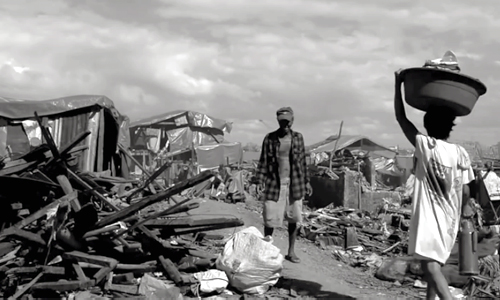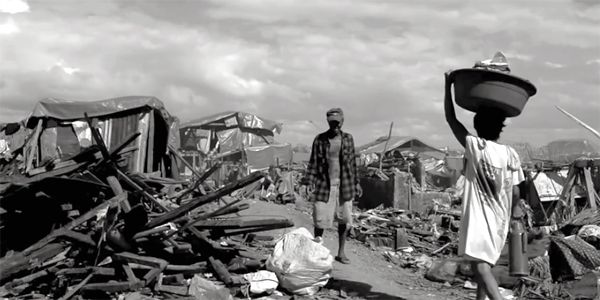

Today is the first anniversary of the tragic and horrific super typhoon Yolanda (Haiyan) which hit the Philippines on Nov. 8, 2013. Global Warming, the harrowing documentary that won second prize in the Action4Climate video competition by filmmakers Dobrin Kashavelov and Ganeta Sagova, shows firsthand the catastrophic devastation Tacloban, the most damaged community in the Philippines, faced 23 days after Haiyan.
Killing 6,000 people and leaving almost 2 million people homeless, with wind speeds hitting more than 180 mph and storm surge of more than 16 feet, Haiyan was the strongest typhoon that ever hit the planet. According to the film, 10 million people were affected by Haiyan with 3 million people that suffered directly from the impact. Five hundred towns and 7,000 villages were swept away.
“My country is being tested by this hell storm called super typhoon Haiyan,” said Philippines climate negotiator Naderev Yeb Sano at the United Nations climate change conference in Warsaw, Poland three days after Haiyan. “The initial assessment showed that Haiyan left a wake of massive destruction that this unprecedented, unthinkable and horrific. And the devastation is staggering. I struggle to find words even for the images that we see on the news coverage.”
“The whole world is one. We brought this climate change to us, all of us,” said Oscar Orbos, Governor of Pangasinan, who was interviewed in the film. “Some more guilty, others less guilty, but humankind has brought this to us. There will be more typhoons of this magnitude. The only solution is for all of us again to do the proper solutions to help us help ourselves. The whole world must be engaged in healing.”
As the climate crisis intensifies more destructive storms are likely. Scientists have warned for decades that pumping greenhouse gases into the atmosphere will increase global average temperatures resulting in more extreme weather events.
This week, the Intergovernmental Panel on Climate Change released its Fifth Assessment Report stating that, “Human influence on the climate system is clear and growing, with impacts observed on all continents. If left unchecked, climate change will increase the likelihood of severe, pervasive and irreversible impacts for people and ecosystems.”
Filmmaker Dobrin Kashavelov, when asked what made her interested in telling this story, she said, “We heard about the typhoon Haiyan from the news. The co-director Ganeta Sagova and I talked about it and we came to the conclusion that we have to visit the city of Tacloban, which was the most damaged area of the Philippines. We were driven by our journalist’s instincts and we didn’t really know what to expect. Initially we were moved by the sheer human drama in the whole situation. We’ve managed to balance this with the climate change dimension of the story that came afterwards.”
The Action4Climate video competition received more than 230 entries from 70 countries from students inspired to share their climate change stories. To watch other Action4Climate videos, click here.
YOU MIGHT ALSO LIKE
Watch Award-Winning ‘Mountains of the Moon’
10 Inspiring Climate Films Win Action4Climate Documentary Competition

 233k
233k  41k
41k  Subscribe
Subscribe 
